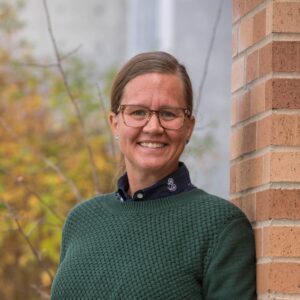The Story Exchange, a nonprofit media platform that aims to elevate women’s voices, announced the winners of its fourth annual Women In Science Incentive Prize, or WISIP.

Heather Holmes, associate professor in the Department of Chemical Engineering, is among them.
The WISIP program, begun in 2021, provides $5,000 grants to women scientists working to combat the impacts of climate change. This year, The Story Exchange sought applicants whose focus is on extreme climate-related events, such as storms, wildfires, floods, droughts and heat waves. The winners were selected following a rigorous scientific review by judges from several universities, as well as an assessment by The Story Exchange editors.
“Without question, climate change is increasingly impacting the intensity, frequency and duration of extreme events, yet many in leadership are choosing to take no action,” says Victoria Wang, co-founder of The Story Exchange. “We believe it’s mission-critical to be investing in innovative women scientists at a time when the world needs them the most.”
Holmes, who also has appointments in the Department of Mechanical Engineering and the Department of Atmospheric Sciences, studies atmospheric processes as they pertain to the spread of pollutants. By developing computational models for how particulates mix and spread through the air, Holmes and her colleagues aim to better inform policy decisions, as well as to give everyday people more tools to protect their health.
Such tools are in particularly high demand in and around Salt Lake City; the topology of the Wasatch Front and other unique features of the Valley routinely produce days with some of the worst air quality in America.
Those same features also exacerbate other extreme weather events, namely, heatwaves.
In a profile by The Story Exchange’s Colleen DeBaise, Holmes describes returning to the University of Utah in 2021 as shocking. After a decade of following her career around the country and world, Salt Lake City had a completely new weather pattern — and average temperatures like nothing she had experienced before.
Now, Holmes is investigating the relationship between heat, drought, and atmospheric patterns, all with an eye toward developing better forecasting models. Such models could give vulnerable members of the population — or those simply working or playing outside — more localized data about potentially dangerous temperatures and air quality conditions.
To that end, Holmes and Jingting Huang, a former lab member, recently published findings about a new way of modeling the spread of particulate pollution from wildfires, based on the height of their initial smoke plumes.
“I’m honored to be selected as one of the 2024 WISIP winners,” says Holmes. “This prize from the Story Exchange will help me continue research related to extreme heat impacting communities in Salt Lake City. It also provides me with an opportunity to share my science with a broader community.”